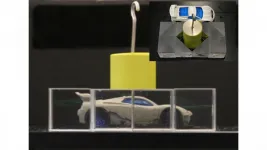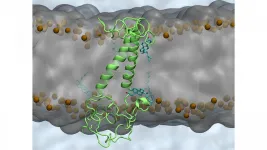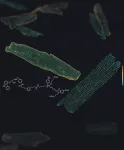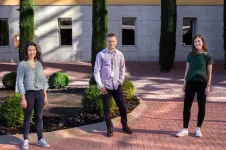Teens' emotions, coping strategies associated with exposure to media-based vicarious racism
2021-06-15
(Press-News.org) What The Study Did: Focus groups were conducted with teenagers to examine their responses to exposure to online and media-based vicarious racism and to explore coping strategies that may be used to combat negative emotions.
Authors: Nia Heard-Garris, M.D., M.Sc., of Ann and Robert H. Lurie Children's Hospital of Chicago, is the corresponding author.
To access the embargoed study: Visit our For The Media website at this link https://media.jamanetwork.com/
(doi:10.1001/jamanetworkopen.2021.13522)
Editor's Note: The article includes conflicts of interest and funding/support disclosures. Please see the article for additional information, including other authors,
INFORMATION:
Media advisory: The full study is linked to this news release.
Embed this link to provide your readers free access to the full-text article This link will be live at the embargo time http://jamanetwork.com/journals/jamanetworkopen/fullarticle/10.1001/jamanetworkopen.2021.13522?utm_source=For_The_Media&utm_medium=referral&utm_campaign=ftm_links&utm_term=061521
About JAMA Network Open: JAMA Network Open is the new online-only open access general medical journal from the JAMA Network. On weekdays, the journal publishes peer-reviewed clinical research and commentary in more than 40 medical and health subject areas. Every article is free online from the day of publication.
ELSE PRESS RELEASES FROM THIS DATE:
2021-06-15
WASHINGTON, June 15, 2021 -- Optical cloaking allows objects to be hidden in plain sight or to become invisible by guiding light around anything placed inside the cloak. While cloaking has been popularized in fiction, like in the "Harry Potter" books, researchers in recent years have started realizing cloaks that shield objects from view by controlling the flow of electromagnetic radiation around them.
In the Journal of Applied Physics, by AIP Publishing, researchers from the Toyota Research Institute of North America examined recent progress of developing invisibility ...
2021-06-15
WASHINGTON, June 15, 2021 -- Alzheimer's disease is predominant in elderly people, but the way age-related changes to lipid composition affect the regulation of biological processes is still not well understood. Links between lipid imbalance and disease have been established, in which lipid changes increase the formation of amyloid plaques, a hallmark of Alzheimer's disease.
This imbalance inspired researchers from Aarhus University in Denmark to explore the role of lipids comprising the cellular membranes of brain cells.
In Biointerphases, by AIP Publishing, the researchers report on the significant role lipids may play in regulating C99, a protein within the amyloid pathway, and disease progression. Lipids have been mostly overlooked from a therapeutic standpoint, likely because ...
2021-06-15
A tickle in the nose can help trigger a sneeze, expelling irritants and disease-causing pathogens. But the cellular pathways that control the sneeze reflex go far beyond the sinuses and have been poorly understood. Now, a team led by researchers at Washington University School of Medicine in St. Louis has identified, in mice, specific cells and proteins that control the sneeze reflex.
"Better understanding what causes us to sneeze -- specifically how neurons behave in response to allergens and viruses -- may point to treatments capable of slowing the spread of infectious respiratory diseases via sneezes," said Qin Liu, PhD, an associate professor of anesthesiology and the study's senior investigator.
The findings are published June 15 in the journal ...
2021-06-15
Research led by the University of Kent and the STFC Rutherford Appleton Laboratory has resulted in the discovery of a new rare topological superconductor, LaPt3P. This discovery may be of huge importance to the future operations of quantum computers.
Superconductors are vital materials able to conduct electricity without any resistance when cooled below a certain temperature, making them highly desirable in a society needing to reduce its energy consumption.
Superconductors manifest quantum properties on the scale of everyday objects, making them highly attractive candidates for building computers which use quantum physics to store data ...
2021-06-15
In the heart there are two different subtypes of beta-adrenergic receptors - beta1 and beta2 - which are activated by the stress hormones adrenaline and noradrenaline. They both trigger the strongest stimulation of the heart rate and pumping capacity that we know of. The two subtypes are highly similar biochemically, but differ substantially in terms of their functional and therapeutic relevance.
Both receptor types can stimulate the heart in the short term, yet when the beta1 receptor is activated over a prolonged period of time, it has a range ...
2021-06-15
DUBLIN, June 15, 2021 - Scientists have identified how and why some Covid-19 patients can develop life-threatening clots, which could lead to targeted therapies that prevent this from happening.
The work, led by researchers from RCSI University of Medicine and Health Sciences, is published in the END ...
2021-06-15
A new antibody testing study examining samples originally collected through the National Institutes of Health's All of Us Research Program found evidence of SARS-CoV-2 infections in five states earlier than had initially been reported. These findings were published in the journal Clinical Infectious Diseases. The results expand on findings from a Centers for Disease Control and Prevention study that suggested SARS-CoV-2, the virus that causes COVID-19, was present in the U.S. as far back as December 2019.
In the All of Us study, researchers analyzed more than 24,000 stored blood samples contributed ...
2021-06-15
Chemotherapy kills tumour cells by causing damage to them. One of the most effective ways of causing damage is to prevent the two DNA strands from separating so that the cellular machinery cannot read the instructions written in the genes. But sometimes, the cell manages to repair the damage and survive, evading the effect of chemotherapy. CNIO researchers have found out how the cell does that and plan to use this knowledge to enhance cancer treatments.
The key lies in a peculiar protein called PrimPol, as explained in a publication in The EMBO Journal by the CNIO's DNA Replication Group, led by Juan Méndez.
The DNA molecule harbours the genes that direct the life of the cell and, ...
2021-06-15
The University of Ottawa has been awarded four new Canada Research Chairs (CRC) that will strengthen its expertise in artificial intelligence, health and law. The University is also proud to announce the renewal of two CRCs that will conduct leading-edge research in quantum communications and photonics.
"The Canada Research Chairs Program provides invaluable support to our researchers as they forge their paths of discovery at a world-class level," said Sylvain Charbonneau, vice-president, research. "The results of this most recent competition will ...
2021-06-15
A review of more than 9,000 U.S. patients with severe COVID-19 infection showed less than 1% contracted the illness again, with an average reinfection time of 3.5 months after an initial positive test. Those are the findings from a study conducted by researchers from the University of Missouri School of Medicine and MU Health Care.
The researchers teamed up with the MU Institute for Data Science and Informatics and the Tiger Institute for Health Innovation to review data from 62 U.S. health care facilities. They found 63 of the 9,119 patients (0.7%) with severe COVID-19 infection contracted the virus a second time, with a mean reinfection period of 116 days. Of the 63 who were reinfected, two (3.2%) died. Patients categorized as ...
LAST 30 PRESS RELEASES:
[Press-News.org] Teens' emotions, coping strategies associated with exposure to media-based vicarious racism





